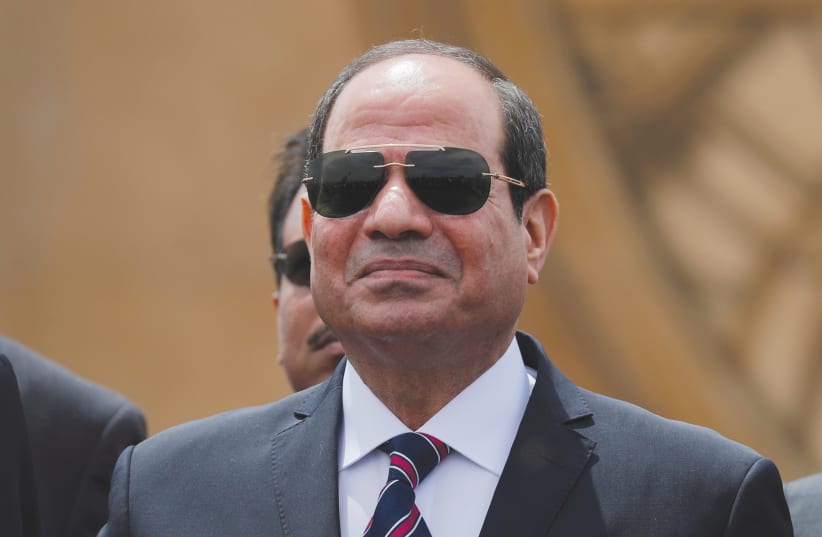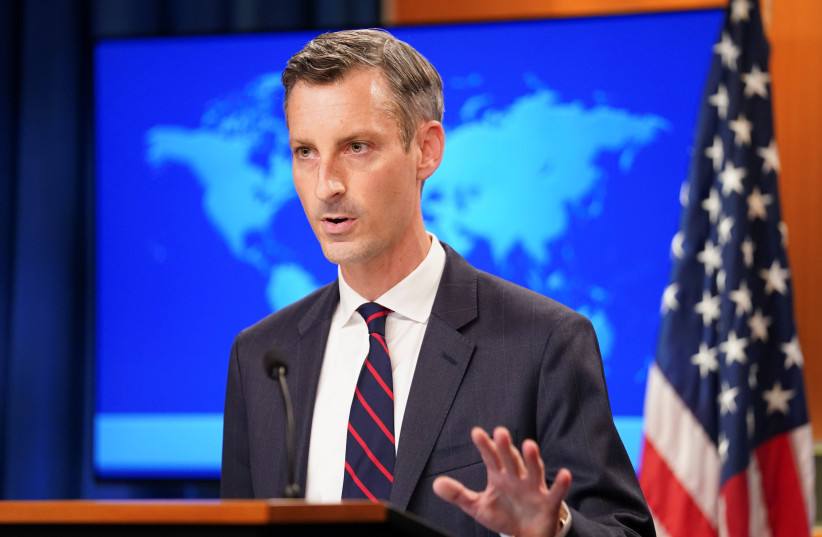On September 11, President Abdel-Fattah al-Sisi launched a blueprint for human rights, after the Biden administration had declined to override a congressional check based on concerns over rights violations and allow the release of some $300 million in military aid.
Three days later, the US State Department announced that Secretary Antony Blinken would release $170 million of the assistance, with the remaining $130 million to be held back based on the rights concerns.
Al-Sisi, in his remarks at the launch of the strategy, drafted by the Supreme Standing Committee for Human Rights established under the authority of the Foreign Ministry, said, “It is my pleasure to start my address on the occasion of the launch of the National Strategy for Human Rights by welcoming you all, contributors to the preparation of this strategy, Egyptians or foreign guests, as you are all sharing with us this radiant moment in Egypt’s contemporary history. I consider this step to be momentous on the path toward promoting human rights in Egypt.”
Dr. Sameh Fawzy, a member of the committee’s consultative board, told The Media Line, “The National Strategy for Human Rights is a remarkable move toward promoting human rights. It is a state-sponsored strategy, drafted by a high committee formed in November 2018, and deliberated with a 25-member consultative board.
“The strategy has been received with great interest domestically and internationally. However, it is time to think about how to translate it into practice; sustaining human rights, in particular, requires well-constructed programs at both cultural and practical levels,” Fawzy said.
Ned Price, the US State Department spokesperson, noted on September 15 that while $130 million of the aid would continue to be withheld, the administration is making available “assistance for Egypt in those categories that I mentioned, and that’s border security, nonproliferation, and counterterrorism programs. And we will move forward with that $130 million, the maximum amount that we could withhold, only if the government of Egypt affirmatively addresses specific human rights-related conditions.”
In July 2020, then-candidate Joe Biden criticized al-Sisi for Egypt’s human rights violations, tweeting: “No more blank checks for Trump’s favorite dictator.”
Of particular interest to the Biden administration, the US Congress and international human rights advocates are the arrests of political dissenters.
Some 60,000 detainees in Egypt are political prisoners, rights groups estimate. These include secular activists, journalists, lawyers, academics and Islamists arrested in a sweeping crackdown against dissent under al-Sisi.
Ramy Kamel is a prominent Christian activist currently detained because of his promotion of Copts’ civil rights. Kamel, also known for advocating for Egypt’s urban poor and rural peasants, was charged in November 2019 with joining and financing a terrorist group and disrupting public peace.
Patrick George Zaki was indicted on September 13 for “spreading false news” after 19 months of pretrial detention. According to the Supreme State Security Prosecution, a special branch of the Public Prosecution, the indictment was based on an article published on the Daraj digital media platform in July 2019 titled “Displacement, Killing and Restriction: A Week’s Diaries of Egypt’s Copts.” The article presents a week in Zaki’s life as a Copt reacting to current events concerning Egyptian Christians.
Said Sadek, a professor of political sociology, told The Media Line regarding the government’s new strategy, “It started some public discourse on human rights culture but the real test is the application. The positive thing is that the state pledged achievements and policies within five years.”
He expressed some skepticism on the next steps, noting they would require changing not only laws but practices that are well established among the security services and significant cultural shifts leading to an end of violence against women and minorities.
Human rights groups and many US congressional officials had hoped the Biden administration would withhold the entire $300 million.
In October 2020, 56 US Democratic lawmakers reinforced Biden’s message in a letter to al-Sisi, urging the release of human rights activists, lawyers, journalists, and other prisoners of conscience. The legislators in their letter chastised the Egyptian leader for the tens of thousands who have been imprisoned during his administration. Many remain in jail, awaiting trial longer than the legal limit of two years.
Tarek Radwan, the chairman of the Human Rights Committee in the Egyptian House of Representatives, said in a statement: “The strategy comes as a clear government commitment to an action plan on an integrated strategy in the field of human rights,” stressing that al-Sisi is eager to implement this strategy.
Radwan emphasized that the Human Rights Committee will continue to be in constant contact with the Supreme Standing Committee for Human Rights and any administrative bodies established to implement the strategy, to carry out its oversight role. The committee will contribute along with all concerned parties to implement this strategy by providing existing expertise and contributing to achieving its goal, he said.
Kamal el-Sawi, an expert on the Middle East and Egyptian affairs and a retired senior analyst for the US Defense Department, told The Media Line that the Supreme Standing Committee for Human Rights “emerged after harsh criticism from [US] Democrats.
“It seems that Egypt was not diligent in releasing prisoners and improving the human rights situation. Some circles in the White House, the National Security Council, and the State Department think that Egypt’s human rights violations should not be tolerated and a clear message should be sent. This was evident in that they announced the suspension of part of the military aid during the Bright Star maneuvers [held every two years by the US and Egyptian military forces] in Egypt, and thus the United States proves that it is serious in this matter,” Sawi said.
Radwan in his statement said that human rights concerns are “a global trend and Egypt is part of this trend and proceeds in all its steps from a conviction of the importance of human rights as a part of the comprehensive development of the state, based on a comprehensive national vision.”
He continued, saying, “President al-Sisi’s naming 2022 as the ‘Year of Civil Society’ represents a new affirmation by President al-Sisi of his respect and appreciation for human rights and the contribution and role of national civil society organizations in achieving this goal.”
Radwan stressed, however, the need to respect cultural differences between different societies, noting that Egypt categorically rejects interference in its domestic affairs.
Fawzy said human rights need to become part of Egyptian culture.
“Among the most influential areas is education. Students have to learn in school and university the principles of human rights through civic education programs. Egypt has drastically suffered from the influence of extremists on the educational system, particularly during the short-lived rule of the Muslim Brotherhood,” he said.
“Since 2014, there is a strong movement to purify textbooks of extremist ideas, excluding teachers who disseminate fanatic and extremist views, and ensuring that activities are performed regularly without interruption. Although the government’s efforts to eradicate extremism from education are indispensable, it seems crucial to complement these efforts with civic education programs that prop up tolerance, participation, and cooperation,” Fawzy said.
Sawi notes that the new “strategy is certainly the result of American pressure, and linking aid to specific conditions will require the US State Department to issue a report to Congress and to the president that the Egyptian administration has responded to the conditions under which the rest of the aid must be released. Otherwise, there is no sense in withholding the $130 million.”
He continued, “The Egyptian administration is in an unenviable position. There are grave violations, especially with regard to those held in pretrial detention for more than two years. What the American administration is asking for is the implementation of the Egyptian Constitution approved by the Egyptian people.”

